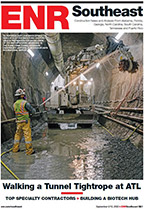Safety as a Priority
“Austin has a well-deserved reputation as the leading contractor in the region. They don’t take anything for granted and always assume they have to earn our business,” says Don Mills, executive vice president of design and construction at KDC Development.
KDC has partnered with Austin Commercial since 1997 and is currently working with the firm on the State Farm project and on the Toyota headquarters.
“Our experience with Austin is an ongoing positive experience. There is consistency in their methods and in their personnel,” Mills says. “They understand the role of general contractor and developer and are not afraid to share risk with their developer partner. Their project approach is well thought out and, as a result, their safety record is exemplary, which is very important to us.”
Safety is one of Austin Industries’ core values, explains Mike Morris, the firm’s vice president of safety. “Industry recognition and awards are nice, but frankly, if Austin could only be recognized for one thing, we would want that one thing to be our commitment and leadership of the industry in safety,” he says.
The firm recorded a TRIR of 0.68 and an EMR of 0.66 in 2014. Austin Bridge and Road also received the 2014 AGC Certificate of Commendation for Excellent Safety Record.
“We try to be relentless in our efforts to evaluate and improve our safety program,” Morris says. “This can be different across different projects with different subcontractor partners or tradespeople, but our commitment to achieving zero accidents does not change.”
Austin’s civil and commercial companies have partnered with industry associations to improve safety performance. “Austin Commercial is requiring subcontractor partner participation in the TEXO Safety First program on all of our projects for the Dallas/Fort Worth metroplex,” Morris says. “We are working at the state level to implement an industry-wide safety orientation for those working in the heavy civil industry.”
Giving Back and Beyond
Beyond the jobsite, Austin Industries, its operating companies and employee-owners are active with numerous charities, including the company’s own charity, the Austin Family Fund, which assists Austin’s employee-owners in times of natural disasters. The firm supports the United Way, March of Dimes, Heart House and Mercy Street Dallas, among others.
Austin Commercial established the annual E.V. Brown Golf Tournament in memory of its co-founder, who died in the late 1990s, notes McAdoo. “Since then, it has raised almost $1 million to benefit pediatric health care needs,” he says.
The prospects for Austin moving forward into 2016 and beyond appear promising. Walls says, “We do not see anything on the horizon that shakes our confidence that this region will produce the kind of opportunities that allow Austin and its operating companies to continue to grow and serve.”
But there are some challenges ahead for the firm and the Texas contracting industry. “We are seeing more alternative-delivery projects and projects that require a higher level of budgeting or preconstruction service and collaboration,” Hewett says. “These alternative-delivery projects are significantly larger in size with relatively higher complexity in the procurement and execution phases than conventional design-bid-build.”
Workforce training and hiring “will continue to be not only Austin’s challenge but this industry’s biggest challenge as well,” Walls says. “It will require the entire industry working together to ensure we have a sustainable workforce going forward. Having talented construction professionals will remain paramount for companies to remain successful.”
Austin participates in an Adopt-A-School program that focuses on using industry resources to introduce high school students to hands-on skills. Since 2008, Austin Industrial has had 57 students enrolled in the program. Today, 29 of these students work at one of the company’s project sites.
“In 2018, Austin will be celebrating 100 years in business, although our roots as an organization go back further, to 1889. Profitable growth and continuous improvement remain paramount for our future,” Walls says. “Each of Austin’s three companies has a series of initiatives to ensure we remain on track for long-term success. Austin Industries continues to focus on employee-owner development to keep our culture strong and intact. We do this with a clear definition of our core values—safety, service, integrity and employee-ownership.”








Post a comment to this article
Report Abusive Comment